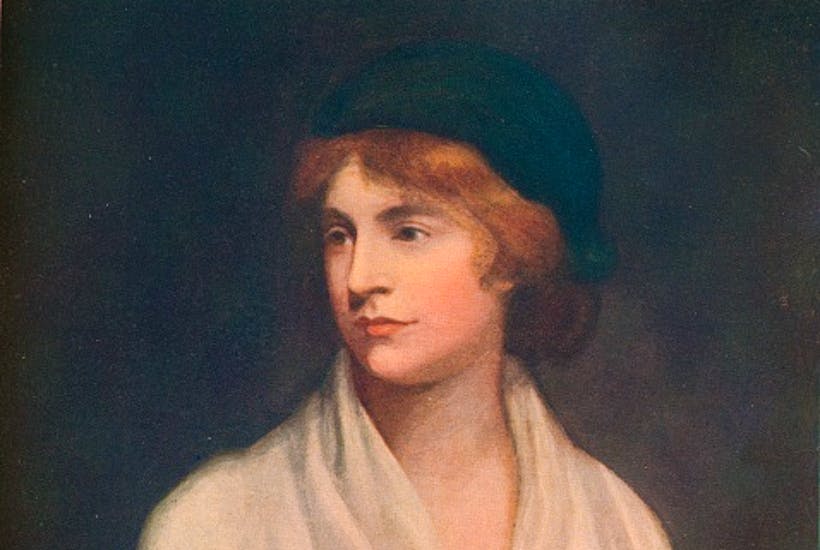Anyone reading Clement Knox’s history of seduction for salacious entertainment is likely to be disappointed: it contains no mention of oysters or Barry White records, and only a very light sprinkling of bawdiness. Strange Antics is a serious and sober tome about libertinism and its consequences, thank you very much. Readers expecting ‘history’, in the conventional sense, will likewise be frustrated: though it dips into legal and political history, this book is principally composed of literary biography and criticism, as Knox draws on the lives of various cultural historical figures and several canonical novels to explore his theme — a format that has lately become something of a go-to for debut non-fiction authors.
In the 18th century men could sow their oats with minimal repercussions, whereas women engaging in dalliances risked social ostracism, economic ruin and pregnancy. As the letter-writer Lady Mary Wortley Montagu put it: ‘Tis play to you, but tis death to us.’ It was in this context that Pamela (1740), Samuel Richardson’s novel about the seduction of a poor girl by her rakish boss, became a bestseller. Richardson said he wrote it ‘to warn the inconsiderate and thoughtless of one of the sex against the base arts and designs and specious contrivers of the other’. Knox credits him with having kicked off the conversation: ‘Anyone who has ever understood seduction as a problem of power. . . has lingered a while in Richardson’s world.’ A similar solicitude for the plight of the ill-used poor informs Mary Shelley’s Frankenstein (1823): Shelley’s monster serves as a powerful metaphor for the abandoned bastard child, its plaintive plea to its creator — ‘How dare you sport thus with life?’ — doubling as a moral rebuke to reckless cads everywhere.
Concern for the welfare of women sometimes dovetailed with racial chauvinism. The Svengali character in George Du Maurier’s Trilby (1894) and the eponymous vampire in Bram Stoker’s Dracula (1897) both played on anti-Semitic stereotypes of Jews as manipulators who could enthral women using hypnotism or mesmerism. Knox revisits the life and times of the black boxer Jack Johnson, who was harassed by the US authorities because he had the temerity not only to become heavyweight champion of the world, but also to consort with — and even marry — white women. Johnson was prosecuted under anti-seduction statutes targeting sexual behaviour which, though consensual, could be construed as exploitative. The 1910 Mann Act criminalised the transportation of women across state lines for ‘prostitution or debauchery, or any other immoral purposes’. The statute’s capacious wording caused all kinds of problems; its main beneficiaries were blackmailers.
These legislative interventions were doomed to fail because they were premised on the idea that women are incapable of autonomous agency: they proposed to solve the problem of seduction by infantilising one half of the population. Knox counsels against trying to ‘tame the chaos of human desire with bureaucratic logic’, subscribing instead to the more holistic approach expounded by Mary Wollstonecraft in A Vindication of the Rights of Woman (1792), which emphasised the importance of education in empowering women to navigate the social world. The advances of the 20th century ultimately proved her right: increased economic independence, together with expanded legal protections and the advent of the contraceptive pill, enabled women to participate in the sexual marketplace on a more equal footing.
The stories told here have been told many times before; Knox’s achievement, in arranging them into a single narrative, is more curatorial than authorial. When his own voice does occasionally come through, we see a young writer with a quaint turn of phrase and a fondness for belletristic flourishes. Some of these are pleasing: he remarks that the case of Loving vs Virginia, which annulled Virginia’s anti-miscegenation laws, ‘served as one of the few occasions when legal shorthand rose to the level of cosmic poetry’. Others are wincingly florid, such as his description of Giacomo Casanova’s ‘sexual endeavours… straying beyond the crooked boundary of the consensually transgressive, past the bogs and marshes of the tolerably deviant, and into the black valleys of sexual crime’.
The book’s closing chapter considers Michel Houellebecq’s gloomy portrayals of chronically lonely male singletons in the late 20th century, a residuum whose misery has since been compounded by the algorithmic logic of digital dating apps. A book that started with an account of the crimes committed by the notorious 18th-century rapist Francis Charteris ends with Knox relating a slightly smug anecdote about witnessing a man attempting, unsuccessfully, to chat up a woman in a pub using a routine he’d picked up online. By framing his narrative in this way, Knox seems to imply that the improvement in the lot of one sex has come at the expense of the other — a theory so simplistic it scarcely deserves to be dignified with a rebuttal.






Comments